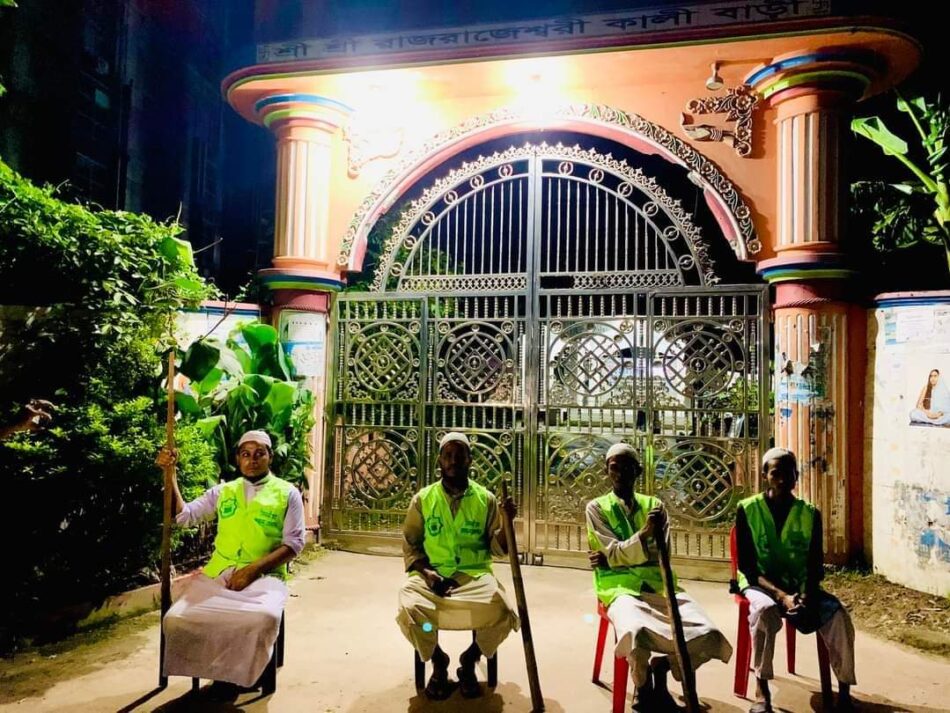India’s involvement in fomenting unrest in Bangladesh has escalated to a dangerous level, with religious tensions being weaponized to destabilize its neighboring state. The recent protests triggered by the arrest of Hindu monk Chinmoy Krishna Das, a prominent leader of a newly formed Hindu group in Bangladesh, highlights this strategy. Accused of sedition, the monk’s detention has sparked violent clashes between his supporters and security forces, plunging the country into turmoil. This incident has not only deepened internal divisions but also escalated into a diplomatic standoff, underscoring the broader implications of India’s meddling in its neighbor’s affairs.
India’s covert involvement in Bangladesh’s internal affairs has become strikingly evident in the wake of Chinmoy Krishna Das’s arrest. Protests demanding his release and greater protection for Hindus have swiftly gained traction, raising concerns about foreign interference. The timing of this unrest, coinciding with regime changes in Bangladesh, strongly suggests that India is deliberately fueling these demonstrations to sow instability, particularly within the Hindu minority community.
The rise of Hindu nationalist groups like the International Society for Krishna Consciousness ISKCON, supported by elements within India, is a troubling indication that India is using religious groups in Bangladesh as pawns to further its geopolitical interests. The claim that these protests are solely for the protection of minorities is questionable when India itself systematically discriminates against its Muslim and Christian populations, a stark contrast to Bangladesh’s approach to safeguarding all its citizens, regardless of faith. Bangladesh has consistently demonstrated a commitment to secularism and religious coexistence, a commitment that is being undermined by external pressures.
India’s actions are an attempt to exploit religious identities in Bangladesh, just as it has done within its own borders, to deepen sectarian divides. By stoking tensions with inflammatory rhetoric and backing anti-government protests, India is seeking to destabilize a peaceful nation while avoiding similar scrutiny for its own treatment of minorities.
Recent attacks on Hindu temples in Bangladesh and the orchestrated protests are not isolated incidents. They form part of a broader pattern of India-backed destabilization efforts, where India’s religiously motivated policies at home are mirrored by its external attempts to provoke unrest. While India remains silent on the persecution of Muslims and Dalits within its own borders, it portrays itself as the champion of Hindu rights abroad, further exposing its hypocritical stance.
The arrest of Chinmoy Krishna Das has become a flashpoint for tensions that India is eager to exploit. Rather than showing genuine concern for the Hindu community in Bangladesh, India is using this incident to rally its domestic base, create international attention, and undermine Bangladesh’s sovereignty. It is a calculated move to stir unrest and shifting focus away from India’s own internal issues regarding the treatment of minorities.
Hindu protests in Bangladesh, though ostensibly centered on minority rights, have been co-opted by external forces to advance an agenda that threatens the country’s stability. Framed as calls for justice, these protests are increasingly being manipulated with support from India’s political and religious apparatus, crafting a misleading narrative that undermines the social fabric of Bangladeshi society.
Bangladesh’s minority Hindu community, like all its citizens, is safeguarded by the nation’s secular laws. Despite ongoing challenges, Bangladesh’s commitment to protecting minorities starkly contrasts with India, where government policies increasingly marginalize Muslims, Christians, and other minority groups. India’s use of Hindu identity as a political tool abroad underscores its disregard for fostering religious harmony within its own borders.
India’s political manipulation of religious communities in Bangladesh is far from accidental. This interference aligns with a broader strategy to destabilize neighboring countries and expand its influence by fostering divisions. Under the pretext of supporting Hindu minorities in Bangladesh, India amplifies protests to create a volatile environment, enabling the pursuit of its strategic goals under the guise of religious advocacy. India’s rhetoric of religious nationalism transcends its borders, as evidenced by the ongoing unrest in Bangladesh, where Indian-backed groups are inciting protests and violence. This reflects India’s larger ideological agenda to extend its Hindu-centric vision across the region. By leveraging religious groups to provoke unrest, India exports its domestic challenges to neighboring nations, further undermining regional stability.
The violence and protests in Bangladesh, fueled by India, are a deliberate attempt to destabilize the country under the guise of championing Hindu rights. Bangladesh must stay vigilant against external forces aiming to sow division and conflict within its borders, especially while India grapples with increasing discrimination and violence against its own minorities. The international community must hold India accountable for its role in igniting religious unrest beyond its borders, while failing to safeguard its own citizens.
The world must recognize the dangerous game India is playing—using unrest in Bangladesh to serve its political interests at the expense of regional stability. India’s hypocrisy must be exposed, as it continues to portray itself as a protector of religious freedom while systematically oppressing its minority communities.
The author is an independent analyst and holds M.Phil in Peace and Conflict Studies and can be reached at sarahamidkhan21@gmail.com
December 5, 2024
The viewpoints expressed by the authors do not necessarily reflect the opinions, viewpoints and editorial policies of Aequitas Review.


